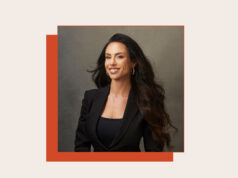Pranks, lies, and farts. Those are just a sample of what couples are revealing to each other, among other deep relationship secrets, on camera. They take on this scary TikTok challenge only with repeated reassurance that they won’t face repercussions from their loved one for telling these truths. How? By saying together in between each confession, “We listen and we don’t judge.” That redeeming one-liner is also the name of this trend, which has since gone viral.
There are hundreds of these videos on TikTok, some with millions of views. In one video from TikTok couple @daveandjanie (29 million views), dad Dave confesses to pretending to go to the bathroom, fold laundry, or fix things in the garage when he really just wants to get away from the kids. (His partner Janie cops to going shopping instead of running errands). Parenting content creator and dad Laro Benz, meanwhile, divulges in a video (16 million views) that he sometimes pretends to be sick because he “just wants to be babied,” while his wife unapologetically reveals she blames her farts on the baby.
Oh, the things we’ll do to go viral. Apparently, watching a couple confront the big and small ways they deceive each other makes for good entertainment. Or, if we’re feeling generous: We love seeing a couple get vulnerable.
Whichever way you slice it, is there anything we can learn about relationship health from this terrifying trend?
“Partners should feel that their relationship is a judgment-free zone where vulnerability and transparency are encouraged,” relationship counselor Genesis Games, LMFT, says, reflecting on the videos. “However, creating such a culture goes far beyond a viral trend. It requires consistent efforts to show respect, admiration, acceptance, and genuine curiosity toward one another.”
A lot of the confessions are playful, especially the ones involving farts. Or, they spark somewhat indignant commiseration about just how much energy parenting sucks out of you. Therapists are laughing at the videos along with us—but they’re cringing, too.
“Watching, I could feel the small heart breaks that went down with the ‘truth’ being delivered,” therapist Joy Berkheimer, LMFT, PhD, the chief sexologist at sexual wellness platform SXWA, tells Well+Good.
Trying the trend for yourself shouldn’t be taken lightly. Here’s what to keep in mind about how “we listen and we don’t judge” conversations—done on camera or off—could affect your relationship.
‘We listen and we don’t judge’ is a great starting point
Watching other couples share their truth under this banner might normalize honest communication. It can also highlight the importance of active listening, without immediately reacting, a technique that can make you a better listener.
“I think this trend has potential as a way to increase truth-telling in relationships,” sexologist & relationship expert Jenn Gunsaullus, PhD, says. “Sharing small secrets in a ‘public confessional’ setting like TikTok might be productive for getting out minor things that have been hidden, especially if it’s done with humor and mutual respect.”
The phrase could even be a great mantra to take beyond the conversation. “‘We listen and we don’t judge’ could become part of a couple’s everyday language, creating more opportunities for honesty and less defensiveness,” Gunsaullus says.
No judgment ≠ no feelings
Suspending judgement when a partner shares a vulnerable truth is usually positive. “Judgment arises when we believe our partner should think, feel, or behave differently,” Games says. So letting go of that “should” can create room for empathy. However, saying “we listen and we don’t judge” doesn’t mean we won’t still feel a certain type of way. “Experiencing hurt, misunderstanding, or disappointment is natural,” Games says.
Essentially, saying “we listen and we don’t judge” doesn’t mean you can expect to tell the truth, and then have the conversation end there.
“This exercise is productive if the goal is having more clarity on what’s going on with your partner, but it does not provide the tools to then navigate how much is too much, what does that really mean for us, about me, about you, or even when it may be unsafe to share secrets you’ve kept from a partner with a temper,” Berkheimer says.
You can see from the expressions of the people in the videos that they struggle to process what their partner has divulged, getting progressively more outraged with each new truth. Perhaps, it would seem, some truths deserve a longer, more serious discussion.
“The fear of being judged is a major reason people lie or hide things from their partners, so the phrase needs to be backed up by action,” Gunsaullus says. “A deeper heart-to-heart conversation about why these lies happen in the first place can help unpack the dynamics in a relationship.”
For example, why are you hiding in the bathroom when the kids are a handful? Why don’t you feel comfortable sharing when you get Botox? “Partners might need to explore whether one doesn’t feel supported, feels overwhelmed, or fears the other will react defensively,” Gunsaullus says.
Should you keep it private–or go public?
Having this conversation in front of an audience for the sake of video views has its pros and cons. It could prevent a blow-up, since recording the conversation on camera for strangers might actually make you “listen” and “not judge,” instead of just saying so. But it could also cause people to “share something purely for attention, which could damage trust,” Gunsaullus says.
“The performative aspect can complicate things,” Gunsaullus says. Instead, to foster empathy in the relationship, strive to have private conversations that have the ability to get into the “why” behind the confessions. In a non-broadcast, judgement-free zone, you can get into “deeper issues like fear, defensiveness, or lack of support in a way that fosters mutual understanding and repair,” Gunsaullus says.
Should we be an open book with our partners? Honesty is the best policy. But how and why you tell each other truths matters just as much as the act itself.









